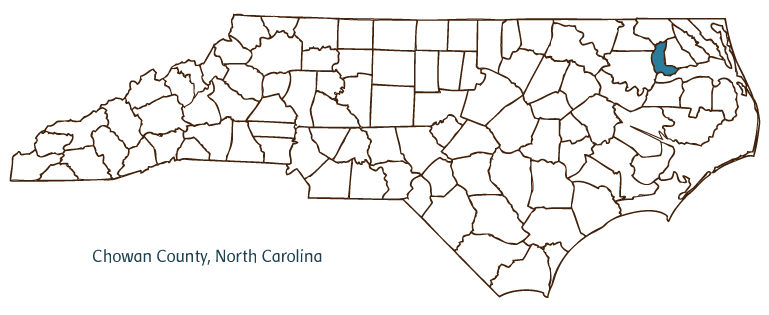CHOWAN COUNTY GOVERNMENT:
https://www.chowancounty-nc.gov/
COUNTY SEAT: Edenton
FORMED: 1668
FORMED FROM: Albemarle
LAND AREA: 172.47 square miles
2020 POPULATION ESTIMATE: 13,708
White: 62.6%
Black/African American: 34.4%
American Indian: 0.5%
Asian: 0.8%
Pacific Islander: 0.2%
Two or more races: 1.5%
Hispanic/Latino: 3.7% (of any race)
CONGRESSIONAL DISTRICT: 3RD
From State & County QuickFacts, US Census Bureau, 2020.
BIOGRAPHIES FOR![]()
Chowan County
 WILDLIFE PROFILES FOR
WILDLIFE PROFILES FOR
Coastal Plain
GEOGRAPHIC INFORMATION
REGION: Coastal Plain
RIVER BASIN: Chowan, Map
NEIGHBORING COUNTIES: Bertie, Gates, Hertford, Perquimans

Chowan County, known as the "cradle of the colony," is located in the Coastal Plain region of northeastern North Carolina. The county was formed in 1668 by English settlers and was originally called Shaftesbury Precinct of Albemarle County. It was renamed Chowan Precinct around 1681 for the Chowan River, itself named for the Chowanoac Indians who inhabited the region. Chowan County is partially bordered by the Albemarle Sound and the Chowan River. The county seat, Edenton, was known as the Town on Queen Anne's Creek until it was incorporated as Edenton in 1722; the city is named for Charles Eden, a North Carolina royal governor. Edenton served as the capital of the colony of North Carolina from 1722 to 1743. It was also the location of the famous Edenton Tea Party (25 Oct. 1774) at which a group of Edenton women pledged unity against oppressive British rule as part of the foment leading up to the American Revolution. Other communities in Chowan County include Tyner, Ryland, Valhalla, and Hancock.
Chowan County, where pride of place is a distinguishing trait, has been called an "architectural treasure house." With Historic Edenton State Historic Site as its center, the county is home to a number of structures that were built more than 200 years ago. These historic places include St. Paul's Church (ca. 1736), the Chowan County Courthouse (1767) -- the oldest courthouse in the state -- the James Iredell House (ca. 1773), the Cupola House (ca. 1758), the Barker House (1782), the Williams-Flurry House (ca. 1779), and Bennett's Inn (ca. 1765). Harriet Jacobs, a writer and educator born into slavery, lived her early life in Edenton and depicted that life in her memoir, Incidents in the Life of a Slave Girl (1861). Chowan County hosts many annual events and festivals, such as the Tea Party Celebration, the Peanut Festival, and the Edenton Christmas Candlelight Tour.
Notable physical features of Chowan County's geography include Edenton Bay, Bear Swamp, Dillard Mill Pond, Bluff Point, and Cherry Point. Among the county's agricultural products are soybeans, cotton, peanuts, oats, corn, tobacco, wheat, sweet potatoes and Irish potatoes, sorghum, chickens, pork, and beef. Its manufactured products include elastics, fishmeal, motor yachts, and carded cotton. The population of Chowan County was estimated to be 14,400 in 2004.
Annotated history of Chowan County's formation:
For an annotated history of the county's formation, with the laws affecting the county, boundary lines and changes, and other origin information, visit these references in The Formation of the North Carolina Counties (Corbitt, 2000), available online at North Carolina Digital Collections (note, there may be additional items of interest for the county not listed here):
County formation history: https://digital.ncdcr.gov/Documents/Detail/the-formation-of-the-north-ca...
Index entry for the county: https://digital.ncdcr.gov/Documents/Detail/the-formation-of-the-north-ca...
References:
National Agriculture Statistics Service, 2017 Census of Agriculture County Profile: Chowan County North Carolina § (2017). https://www.nass.usda.gov/Publications/AgCensus/2017/Online_Resources/Co...
Speller, Benjamin F. “A Brief History of Chowan County.” Visit Edenton. Edenton-Chowan County Tourism Development Authority. Accessed December 15, 2021. https://www.visitedenton.com/chowan-history.php.
Parramore, Thomas C. Cradle of the Colony: The History of Chowan County and Edenton. Edenton: Edenton Chamber of Commerce, 1967.
Additional resources:
Corbitt, David Leroy. The Formation of the North Carolina Counties, 1663-1943. Raleigh: Division of Archives and History, North Carolina Department of Cultural Resources, 1987. https://digital.ncdcr.gov/Documents/Detail/the-formation-of-the-north-carolina-counties-1663-1943/3692099?item=4553233 (accessed June 20, 2017).
Chowan County Government. "Chowan County North Carolina." https://www.chowancounty-nc.gov/ (accessed February 13, 2019).
Edenton-Chowan County Tourism Development Authority. "Visit Edendon." https://visitedenton.com/ (accessed February 13, 2019).
DigitalNC. "Chowan County." North Carolina Digital Heritage Center. https://www.digitalnc.org/counties/chowan-county/ (accessed February 13, 2019).
North Carolina Digital Collections. "Explore by ... [place, time period, format]." North Carolina Department of Natural and Cultural Resources. https://digital.ncdcr.gov (accessed February 13, 2019).
Image credits:
Rudersdorf, Amy. "NC County Maps." Raleigh: Government & Heritage Library, State Library of North Carolina, 2010.
1 January 2006 | Powell, William S.
